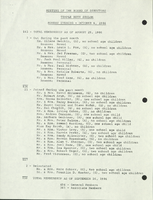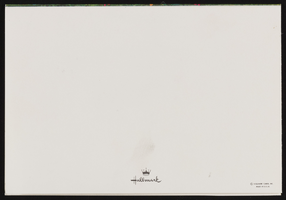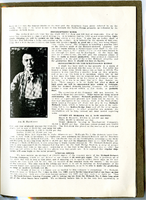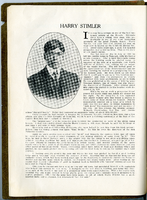Search the Special Collections and Archives Portal
Search Results

Transcript of interview with Jeanne P. Chretien by Cynthia L. Reeves, February 26, 1979
Date
Archival Collection
Description
On February 26, 1979, Cynthia L. Reeves interviewed Jeanne P. Chretien (born 1923 in Marshalltown, Iowa) about her life in Southern Nevada. Chretien first talks about her move to Las Vegas and her beginning education, including how the educational system has changed over time. She also describes her first occupations, political activity, involvement in groups such as the Girl Scouts, and early recreational activities. The two later discuss Block 16, entertainment, the atomic testing, the effects of World War II, and flooding in Las Vegas. The latter part of the interview includes topics on Chretien’s religious activity, her enrollment into Nevada Southern University, and the changes in Las Vegas over time. The interview concludes with Chretien’s thoughts on rearing children in Las Vegas as well as how she believes the city will continue to grow in the future.
Text

Transcript of interview with Theresa Jones Denning by Lynn Kelstron Ballard, February 26, 1977
Date
Archival Collection
Description
On February 26, 1977, Lynn Kelstrom Ballard interviewed Teresa Jones Denning (born in Overton, Nevada in 1912) about her life in Southern Nevada. Denning first talks about her family background and her upbringing in Overton, including her life on a farm and her education in that small town. Denning also talks about her recreational pastimes before talking about the building of Boulder Dam and her life in Boulder City. Towards the end of the interview, she talks about her work as a driver for Las Vegas High School, her husband’s work on the Boulder Dam, and the changes in living conditions that she has noticed in Boulder City over time.
Text

Transcript of interview with Ruth and Jake Dieleman by James M. Greene, November 15, 1974
Date
Archival Collection
Description
On November 15, 1974, James M. Greene interviewed Ruth Dieleman (born 1908 in Searchlight, Nevada) and her husband Jake Dieleman (born 1904 in Axel, Netherlands) about their lives in Southern Nevada. Ruth first talks about her life in Searchlight while growing up, her experience as an educator, and her various residences in Southern Nevada. Jake first talks about his immigration into the United States and his eventual move to Nevada to get into construction rigging for the building of Hoover Dam. He discusses his work as a rigger in detail but also discusses his work on various Las Vegas casinos as well as his work in the state legislature.
Text

Transcript of interview with Dennis Ortwein by Claytee White, May 6, 2009
Date
Archival Collection
Description
Dennis Ortwein arrived in Las Vegas in 1956. He shares many details about growing up in Montana, his parents and siblings, his education, and the moment in time when he was offered an opportunity to work in Las Vegas. He also lays out the path his singing career took, starting with school plays, duets with his sister, and high school quartets. Once in Las Vegas, Dennis taught for a while, served as principal, and was involved in creating programs that helped integrate schools. He also talks about his church choir work, entertainment in early Las Vegas, above-ground testing at the Nevada Test Site, and anti-nuclear protests. Dennis served as lab school and student teaching coordinator in Nigeria. He offers several anecdotes and stories about the time he and his family spent there. After retiring early (age 53), Dennis acted as consultant to the Esmeralda County school board, executive director for the National Conference of Christians and Jews, and wrote a book. He is currently enjoying his singing career by appearing at conventions, in musicals, and at weddings and memorials.
Text

Gene Leavitt interview, February 28, 1979: transcript
Date
Archival Collection
Description
On February 28, 1979, collector Monte Leavitt interviewed Gene Leavitt (born October 6th, 1923 in Mesquite, Nevada) at his home in North Las Vegas, Nevada. In this interview, Mr. Leavitt talks about his career as a truck and bus driver. He also talks about the life in Southern Nevada, the soldiers stationed here, and gambling.
Text

Minutes from Temple Beth Sholom Board of Directors meetings, June 1987 - May 1988 (2 of 2)
Date
Archival Collection
Description
Meeting minutes include reports from committees of the board, correspondence, and balance sheets.
Text
Blanche Zucker-Bozarth Photograph Collection
Identifier
Abstract
The Blanche Zucker-Bozarth Photograph Collection contains black-and-white and color photographic prints, negatives, and slides of Blanche Zucker-Bozarth between approximately 1980 and 2000. These images depict Zucker-Bozarth attending University Library Society gatherings at the University of Nevada, Las Vegas (UNLV), community fundraisers and events, and award ceremonies. During University Library Society gatherings, Zucker-Bozarth is seen with UNLV Libraries and campus-level administrative faculty and associates. The collection also contains Zucker-Bozarth attending events for the WE CAN (Working to Eliminate Child Abuse and Neglect) Fundraiser and the President’s Child Safety Partnership. Other photographs include Zucker-Bozarth holding the Chicago Award, Zucker-Bozarth posed with Mesquite Club members, and various individuals in Las Vegas and Carson City, Nevada.
Archival Collection



